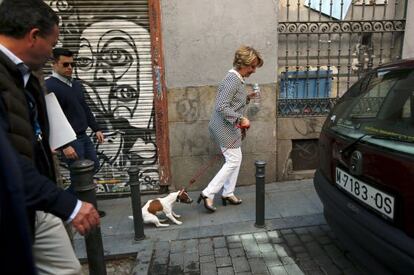Aguirre’s divine intervention and the discreet vote of Ana Botella
The tightest electoral race for decades in Spain has not passed without anecdotes

After the relative calm of Saturday’s “day of reflection,” election day in Spain on Sunday has seen a bit of everything – from candidates who put themselves in the hands of God, and no doubt those who have called on the devil. Each politician up for election, or reelection, today has done whatever they needed to get through the most uncertain polls since Spain returned to democracy.
1. Aguirre’s divine intervention. The president of the regional chapter of the Popular Party in Madrid, and candidate for the mayoral race in the Spanish capital, Esperanza Aguirre, came to vote early on Sunday. First she left her dog, Pecas (Freckles), with one of her children at the door of the Pi i Maragall school in central Madrid, and then on her way out told reporters that she hoped that the Holy Spirit would inspire Madrileños to “come out and vote for the best of Madrid.”
2. No miracles for poet García Montero. Aguirre may well have left the polling station in search of a saint or perhaps she headed straight for Mass. What is known is that after voting she bumped into the candidate for United Left (IU) for the Madrid region, Luis García Montero, along with his wife, the writer Almudena Grandes. The poet responded to Aguirre’s call for divine intervention saying that on this occasion, not even the Holy Spirit would be able to work a miracle and that the “gospel truth” is a message of change, a word that has been mentioned in practically every campaign. “The gospel truth has more to do with a change in politics than with the perpetuation of those corruption networks, the lack of transparency, and the injustices that are represented by Esperanza Aguirre,” he told reporters. He was also the recipient of a truth on Sunday: an elderly lady approached him to apologize for not voting for him, despite, she said, being “a leftist.”
3. The normality of Rajoy and the face of Carmena. At the Bernadette de Aravaca polling station, Prime Minister Mariano Rajoy voted on Sunday, and commented to the press afterwards that the best news of the day so far is that there was no news. The day was progressing with normality, the PM stated. At the polling station, voting supervisors from Rajoy’s Popular Party (PP) were busy requesting that supervisors from Ahora Madrid (the party consisting of representatives from anti-austerity group Podemos, among others) removed a photo of their candidate, Manuela Carmena, from their official accreditation cards. The PP representatives took the matter to the local Election Board in the area, which ruled that the photo contravened electoral legislation. Ahora Madrid had to instruct its 1,700 polling supervisors to modify their cards and remove the face of the candidate.
4. The discretion of Botella. The outgoing mayor of Madrid, Ana Botella, came to vote at the Everest polling station, in Pozuelo de Alarcón, with her husband, former prime minister José María Aznar. He collected his voting papers in full view of onlookers, while she opted to vote from the privacy of a polling booth. Neither Botella nor Aznar were willing to make public statements.
Tu suscripción se está usando en otro dispositivo
¿Quieres añadir otro usuario a tu suscripción?
Si continúas leyendo en este dispositivo, no se podrá leer en el otro.
FlechaTu suscripción se está usando en otro dispositivo y solo puedes acceder a EL PAÍS desde un dispositivo a la vez.
Si quieres compartir tu cuenta, cambia tu suscripción a la modalidad Premium, así podrás añadir otro usuario. Cada uno accederá con su propia cuenta de email, lo que os permitirá personalizar vuestra experiencia en EL PAÍS.
¿Tienes una suscripción de empresa? Accede aquí para contratar más cuentas.
En el caso de no saber quién está usando tu cuenta, te recomendamos cambiar tu contraseña aquí.
Si decides continuar compartiendo tu cuenta, este mensaje se mostrará en tu dispositivo y en el de la otra persona que está usando tu cuenta de forma indefinida, afectando a tu experiencia de lectura. Puedes consultar aquí los términos y condiciones de la suscripción digital.









































